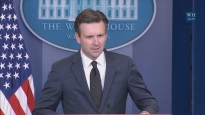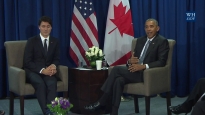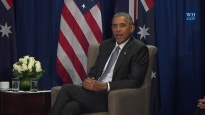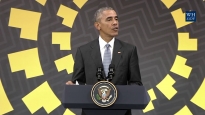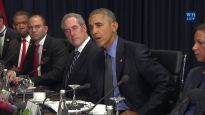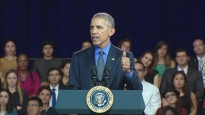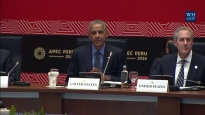Briefing by Deputy Press Secretary Josh Earnest
November 14, 2011 | 26:19 | Public Domain
Deputy Press Secretary Josh Earnest briefs members of the press in Honolulu.
Press Briefing by Principal Deputy Press Secretary Josh Earnest, Bill Weldon, CEO for Johnson & Johnson, Rich Lavin, Group President of Caterpillar and Eric Schmidt, CEO for Google, 11/12/2011
Moana Surfrider Hotel
Honolulu, Hawaii
1:05 P.M. HAST
MR. EARNEST: Good afternoon, everybody. I have one quick scheduling announcement before we get started. As many of you have seen, President Calderón from Mexico is not traveling to Hawaii for the APEC Summit, in light of the tragic helicopter accident in Mexico yesterday. Therefore, the North American Leaders Summit, that had been planned for Sunday evening, has now been postponed. We don’t have a date for when that has been rescheduled yet.
We do anticipate that President Obama will have the opportunity to visit with Prime Minister Harper on the sidelines of APEC tomorrow. But again, the North American Leaders Summit that was a working session and a dinner that had been planned for Sunday night had been postponed.
Q Josh, so that will be tomorrow night, the Harper-Obama bilat?
MR. EARNEST: They will meet on the sidelines of the APEC conference. So I’m not sure -- in terms of that timing, I think they’re still trying to work that out. I will see if we can get you guys a readout of that conversation to at least let you know when it’s occurred.
With that business out of the way, I want to introduce a couple of gentlemen who are here in Hawaii this weekend, participating in the APEC CEO Summit. Standing immediately to my right is Bill Weldon from Johnson & Johnson; and then Rich Lavin, to his right, from Caterpillar. They’ll each make a couple of -- they’ll each make some brief opening remarks and then we’ll open up for questions after that.
So Bill, do you want to go first?
MR. WELDON: Sure, thanks. The Asia Pacific regions is important to Johnson & Johnson and to many U.S. businesses because it represents a large and growing part of the global economy. If you think about it, the 21-member economies comprise 2.7 billion consumers, account for 44 percent of the world trade, represent 55 percent of global economic output, includes six of America’s 10 largest trading partners, and represent the fastest-growing region in the world.
The people of the APEC region have important non-met medical needs that our products and services can help meet. These economies are aging and the incidents of most chronic diseases rises with age. APEC countries are also experiencing a growing middle class and lifestyle changes that are linked to rising rates of non-communicable disease.
APEC is the premier forum for U.S. engagement in the Asia-Pacific region. APEC is helping remove barriers to trade and investment for U.S. businesses. Since APEC was created, average tariffs in the region have fallen, and trade between the U.S. and the region has grown significantly. APEC is working toward domestic economic structures in APEC economies that are market-driven, non-discriminatory, not government directed to protectionist, and that support competition and open markets.
J & J supports APEC’s work this year for a myriad of reasons. The first is to reduce the economic burden of rising rates of chronic, non-communicable disease by taking steps to track health risks and outcomes; drive regulatory convergence across the APEC region for medical products regulation by 2012, which would lower market barriers to entry for medical products; develop new biopharm and medical device codes of ethics, which will enhance a level playing field for businesses; implement regulation that supports the life sciences; increase transparency and greater inclusivity of stakeholders, which will enhance predictability of government decisions and opportunities for engagement.
And health care as the largest sector of the global economy, and as such, represents an important opportunity for U.S. exports. America is a world leader in the development of new medicines and medical devices that meet patients’ needs. And particularly at a time of economic uncertainty, it’s important to focus on growth opportunities. We support efforts to deepen America’s trading ties with Asia, thereby expanding U.S. export opportunities.
Thank you.
MR. LAVIN: Good afternoon. Trade is, for Caterpillar -- and really for the continued benefit of the global economy -- absolutely essential. And in that context, the work that’s being done in association with APEC is absolutely critical. From our very beginning, Caterpillar has been an exporter and has relied on a global business model for our success. This week, we made a couple of announcements that are part of our overall strategy to grow our operations in the United States, Asia, and in Europe.
These growth plans are driven by our commitment to serve our customers in every part of the world. A couple of examples: We announced a new mining facility in Batam, Indonesia, in an expansion of our existing facility outside of Jakarta. We’ll invest about $150 million in the new facility, which is expected to be operational in 2012 for truck bodies, and in 2013 for chassis.
Our growth strategy also includes a series of investments and capacity expansion plans for operations across Asia, including a quadrupling of our excavating manufacturing capacity at Caterpillar Xuzhou in Xuzhou, China, where we now have 16 manufacturing facilities and nine more that are in construction.
Free open trade helps drive our ability to compete and make these investments, which I think leads me to a very important topic, and that is U.S. jobs. With two announcements, we expect to create an additional 1,400 jobs in North America. One of the announcements has to do with our building construction products division in North Carolina. And the other has to do with two of our largest mining equipment manufacturing facilities located in Illinois. We’ll invest over $600 million in the two Illinois-based manufacturing facilities. And between 80 and 90 percent of their total production goes outside of the state of Illinois.
Those job additions are on top of the more than 30,000 additions to our workforce that we’ve made since 2009. Twelve thousand of those jobs have been added in the United States, and 18,000 of those jobs have been added outside of the U.S. in other markets.
As I mentioned, the work of APEC is absolutely critical to drive a continuing opening of markets. It’s essential to our growth and expansion not only in Asia but also in the United States.
Thank you.
MR. EARNEST: Thank you. We’ve also been joined by Eric Schmidt from Google. Eric, do you want to make a couple of comments? And then we’ll open it up for questions.
MR. SCHMIDT: Hopefully short. America has a jobs problem. Jobs are created in America by two sectors -- one is fast-growing small businesses; the other half is from large multinationals, who have export businesses. The fastest way to create more jobs in America then is to increase our exports to the fastest-growing parts of the world, which happen to be in Asia, where slow growth is considered to be 4 percent, and the highest growth I found so far is 25 percent per year, Q.E.D.
MR. EARNEST: All right. With that, we’ll open it up to some questions. David.
Q This is for anyone who cares to answer. I was curious what your impressions of both President Hu and President Obama’s sort of visions for how they see growth happening in Asia -- whether you found them to be in any way sort of competing visions for sort of dominance in the region. And if so, what you make of that and sort of how the two countries might be able to work together, or what potential hurdles there might be to driving that growth?
MR. EARNEST: Who wants to take that one? Bill, do you?
MR. WELDON: I think if you look at it just holistically, they both see tremendous opportunities. I think TPP and others are looking at ways for the countries to all work together and to enhance trade opportunities. And I think no matter how you look at it, there are great opportunities. I think they both see them, and they’re meeting to try and take down whatever barriers they see that exist. So I think the opportunities are extraordinary, and I think that was communicated by both of them.
MR. LAVIN: I thought there was really a pretty high level of consistency between the message of President Hu and the message of President Obama -- I mean, really, a strong endorsement for trade generally and a strong endorsement for some of the initiatives underway to expand free trade in the Asia Pacific region.
I also thought there was a message of the need for engagement in continuing openness between China and the United States. So I thought very strong messages on trade, a real endorsement of trade for both companies. And I heard a commitment to continue to work together to resolve issues.
MR. EARNEST: Chuck.
Q Two questions. One to Mr. Schmidt, what you just referenced. How do you incentivize these other Asian countries who have this incredible growth to sort of say, okay, now we want to do some trade deals with the United States that might slow our growth and help the United States? That they might view it as, why should we change anything we’re going; this is working well for us? And obviously, we’re hoping to change the game a little bit to make it work better for the United States.
And then the second question involves China, sort of a follow-up there. What is the patriotism line here, where you feel as if what’s good for your business in China isn’t good for this competitive nature with the United States because maybe China is doing business in a way that’s hurtful to the United States because of currency issues and such?
MR. SCHMIDT: Okay. So the first --
Q The first part is the emerging market, you just described all these -- everybody involved here -- there's this huge -- I mean, why should they change anything that they’re doing --
MR. SCHMIDT: Well, because they want our stuff. And --
Q But how do we incentivize them?
MR. SCHMIDT: No, trust me, they want it. If you look at the view of America in Asia, we’re still the best -- we have excellent Hollywood films and things like that -- but we’re fundamentally the best area for research and new innovation for the industries that they care about.
So a simple model is that America invents the technology; it’s initially commercialized in places like Korea and Taiwan, and then it’s globalized at scale in these vast manufacturing caverns of China. That’s a simplification, but it’s roughly correct. So they need what we’re doing. We obviously need access to their products, and they help monetize our debt and things like that.
So it’s in all our of countries to have these free trade agreements, it’s in their interest, too. I think in many ways, America’s best export is its companies, because when we operate in their countries, we operate by American rules. We treat women on an equal basis. We have free expression rules, and so forth and so on. So there’s many, many reasons why free trade is in fact a very a good export for America.
Q Do they see that?
MR. SCHMIDT: Of course. That’s why they’re all clamoring for it. Now, at some point, they may become sufficiently confident, arrogant, or what have you, that they’ll decide that’s not true, in which case we’ll have a different problem. But today, they all want it, and I hear it every day.
Q Can one of you speak to China, sort of that line of --
MR. WELDON: Yes, I think we’ve all looked at China as this extraordinary consumer base, and yet, we recognize they’re a extraordinary competitor over time. And so I think that -- and I’ll pick up where Eric was -- I think when you look at innovation and the way we innovate in the United States, you have to continue to innovate to move forward. So you’re going to look at competitors and you’re going to look at markets, and I think that’s the global environment we work in today, that you’re always going to be competing with people, but you’re also going to be using them as consumers.
So I think we have to continue to innovate, bring ideas and new products and new opportunities into the marketplace. And I think it’s a vicious cycle, but I don’t think you can ever neglect to recognize and realize that there is a competitive piece to this, as well as a consumer part of it. And you just have to continue to compete on a global basis.
Q Would you say no to a deal, though, that’s good for your bottom line, but sort of China’s offering you this deal --
MR. SCHMIDT: We did that. (Laughter.)
MR. WELDON: Yes, and I think anybody would do it if we felt it was the wrong thing to be doing. And I think that’s the other piece that was mentioned earlier. We are working on U.S. laws, U.S. regulations. And we work in the way that we think is appropriate; and if it’s going to be inappropriate we’re not going to do it.
Q Gentlemen, can you talk a little bit about how much Europe, so far, has come to dominate the talks at APEC even though it's not the focus?
And also, what assurances you’re getting from the administration that President Obama understands business's needs?
MR. LAVIN: Well, I mean, Europe has been a subject in the discussion, for sure -- both in the general sessions and in some of the smaller sessions. Everybody recognizes that what happens in Europe over the next three, six months, 12 months will have an effect on the global economy. So it’s been on everybody’s mind, and there’s been very good discussions.
I think one of the messages I took away from this morning’s address by the President was his strong commitment to the growth of U.S. business. The message about trade was very clear. The message about support for U.S. businesses was clear. But he also said -- going back to one of the earlier questions -- that we’re going to use APEC, for example, in order to ensure that the rules fn trade are clear. He said that the U.S. is at its best when we are playing by the rules and everybody else is playing by the rules. So I think that was a very important message coming from the President this morning, in addition to, I think, his strong message of support for exports, trade and U.S. business.
MR. SCHMIDT: The President has appointed a whole bunch of interesting business councils. In his speech this morning he referred to some of the work of them to actually take some of the more sclerotic parts of our policies in government and sort of change them so that they don’t prevent things. So that’s a tactical example of his leadership on this. And there are many, many such examples.
I think he’s done a particularly good job of articulating that we want to do trade and globalization under a set of well-understood rules, and that he’s willing to prosecute violations of those rules.
The other thing I’d like to echo is that in every meeting that I’ve been in with any form of leader, assistant leader, what have you, they’re all talking about the Europe issues. Everyone is aware of it. Everyone is worried about it. It could go the wrong way. So it's very much a current crisis.
MR. EARNEST: Bill, do you have anything to add?
MR. WELDON: I guess the one thing I would add is that we have to recognize that, if you use Johnson & Johnson as an example, 20 percent of our employees in the United States support our businesses overseas. So as our businesses grow we continue to create jobs in the United States. So I think it's very important that we recognize that we have a global environment; we have to continue to grow our business on a global basis, and that will continue to create jobs in the United States.
Q The issue of China and its currency and trade policies have become a hot topic in the Republican presidential debates. And I'm wondering if you think it's a good thing for this to surface as a political issue? Does it help put pressure on China, or do you think there are risks in that?
MR. LAVIN: I'll take a stab. Currency was discussed this morning by the President, and of course, it is an important part of the overall relationship, the trade relationship, between the United States and China. In Caterpillar, we've been encouraging and participating in what we would say are diplomatic discussions on the issue of currency and other trade issues. I think it's inevitable that currency will become a political issue. But we've seen the kind of behind-the-scenes discussions and negotiations have been very effective in encouraging China to strengthen their currency. And in fact, I think it's probably strengthened between 25 and 30 percent over the past three or four years.
So I think the worst thing we can do is encourage a process that may result in some sort of trade friction or trade war between the two largest economies in the world. So at Caterpillar, we're really encouraging continuing behind-the-scenes discussions and negotiations to move China toward stronger currency.
Q Have you seen in the markets any sign of a slowdown in growth (inaudible) -- and what impact will that have on exports to the region and (inaudible) -- and also, the President talked about intellectual property with China this morning. Can you give us some examples of where -- (inaudible) -- to you in your operations?
MR. WELDON: I think the global markets have slowed down, whether they're in Asia or anyplace else, but I think we need to recognize that the fastest-growing markets in the world are here in Asia. So even if they're slowing down, they're slowing down -- they're still growing at a much higher rate than most of the markets around the world. So I think it's important to recognize that and we have to continue to compete in that environment.
Q I have one for Mr. Schmidt, please, on the comments you made about America's jobs problem. How quickly can there be a turnaround that American people would really see? When we talk about TPP and this announcement today, which will still take months to come together, the recent trade deals, the President's overall focus on the Asia Pacific, we hear gaudy numbers about hundreds and millions of consumers and it will help jobs, but will we actually see results of these things anytime soon?
MR. SCHMIDT: we have a math problem that's roughly the following: America's population is growing -- which is a good thing, by the way, compared to a whole bunch of other countries; businesses like these ones are busy automating ahead of hiring; and so the GDP of America has to grow above some threshold for hiring to really start. One estimate is that it's 2 to 3 percent. In other words, we have to be growing pretty well before hiring really starts.
So the jobless problem is much more severe as a sort of structural problem -- and by the way, it's much worse in Europe than it is in the U.S. It's also much worse in Japan than it is in the U.S. -- to put it in context. So from my view, the TPP and the other things are part of a much broader package that the President and businesses are pursuing that will ultimately release in job improvement.
But if you just do the math, it takes some number of years just to absorb the terrible things that occurred in 2008 because of the financial crisis. And so I'm worried that it's much longer than people are talking about, and I say that without humor. I mean, it's a very serious issue and the way we need to operate as a business, as the government, is we've got to talk about it honestly and say we've got to figure out a way to get these economies growing faster, and that's done by investment in the private sector, creating new businesses, and all the things that we represent -- and new markets, obviously, free trade, et cetera.
Q And years?
MR. SCHMIDT: No one knows. If I knew that I would be very, very, very well known.
Q If I could just ask you to comment -- I know we're here at APEC, but I wonder if I could get you to comment on the work that Congress is doing on the super committee, and the President called the co-chairs of the super committee yesterday because of talks that they may be trying to get out of the trigger or the sequester -- they have to get done by November 23rd. How concerned are you about Congress's inability to come to agreement on deficit reduction? Can I start with --
MR. EARNEST: You want to talk with these three gentlemen?
You've already heard me talk about it.
Q With all due respect, yes, we do hear from Josh and the White House. I want to hear what business leaders have to say about the concern they may have in the U.S. economy.
MR. SCHMIDT: I don't want to actually answer the specific question because I don't know enough about the -- I, frankly, have spent the last two weeks in Asia, which I haven't been focusing on the super committee, so they've been having a good time. What business needs is predictability. And one of the problems with the current political system, and in particular the debt crisis -- which to some degree was avoidable -- is it sort of delays investment. It causes people to question.
So if you listen to the business community -- and I spend all my time to listen to everybody complain about this stuff -- they actually just want an answer. And with that, we can do our job really well. I don't know if you all agree with that or not.
Q On TPP -- Japan announce its intention to participate in TPP, in negotiations. What would be the potential implication of Japanese participation on your business?
MR. LAVIN: Well, Japan's indication of their willingness to participate in TPP was welcomed. Japan is a large and very significant market for Caterpillar. We've had a manufacturing presence inside Japan for more than 45 years. So bringing them, I think, within the umbrella of TPP, and ultimately a broad-based trans-Pacific free trade agreement, is going to benefit our business in Japan but also our business outside of Japan.
I think our view of free trade is more, sooner, and broader. And so to the extent that we can broaden the number of companies participating in TPP I think is going to be beneficial not only for Caterpillar's business but also for all the companies doing business in this part of the world.
Q In Washington, there was a report issued about U.S.-ASEAN business relations, basically saying that -- it sounded like we dropped the ball over the last few years. Why do you think -- and you all deal in ASEAN countries, as well as China -- why do you think that has happened, specifically with the ASEAN nations? I mean, it seems like you all have been working on this for many, many years, and yet a report comes out saying we basically have to refocus again on that.
MR. WELDON: Yes, I think your word "refocus" is really the important one. I think there's been a lot of things that have been in the media and a lot of events that have caught of attention, and there's been a lot of efforts that have gone in many different areas. So I wouldn't say that there's been a drop of the ball. I'd just say it's a refocus and a recognition of the extraordinary opportunities that are here and being able to refocus on and make sure that we are working to enhance the ability to be competitive in this part of the world.
But I think there's been a lot of distractions and a lot of things have been going on, as well as the efforts that have been taking place over here.
MR. SCHMIDT: I'm not sure I agree with the premise of your question, so maybe the report is not correct. I'd have to look at it. What is the name of the report?
Q I can't recall. It was the CIS report or -- basically about the U.S.-ASEAN --
MR. SCHMIDT: My sense is the American business has been growing very nicely and very dramatically in Asia for a decade. And this has been the topic for a long time. I think it's true in each of these guys' business as well as mine. It's doing very well, and that hasn’t changed and it's unlikely to change just because of the mathematics. You have a billion people going into the middle class; they're going to need to buy products from everybody.
Internet growth, which is something I'm focused on, is the fastest in the world in Asia and the emerging parts of Asia as well as in Latin America. That shouldn’t be a surprise. It's been true for a while and it will continue.
MR. EARNEST: I think I would add to that -- and we'll certainly talk about this a lot over the course of the next week of this trip -- is that certainly one of the core elements of the President's foreign policy is an interest in reengaging in Asia, for many of the reasons that they've been talking about here. So to the extent that there are some who have found that the United States has been a little underweighted in Asia in the past, that certainly has been a core focus of the President's efforts on foreign policy, certainly as evidenced by this trip even.
Jake.
Q I was wondering if I could get your thoughts on President Obama to you today that, we've been a little bit lazy over the last couple decades, taking for granted people would want to come here, we aren’t out there hungry, selling America, trying to attract new businesses into America. Has the nation been a little bit lazy in promoting itself? Mr. Schmidt? I'd like to hear from all three of you, though.
MR. SCHMIDT: Relative to what standard of laziness? I mean, the country has had this as a policy for a while.
Q This wasn’t my answer --
MR. SCHMIDT: I understand. It's hard for me to answer the question without understanding what we're judging it against.
Q Do you think the nation should have been, could have been more aggressive in selling itself over the last decade or two?
MR. SCHMIDT: Always. But I would have said that independent of any other fact. I think the government and the nation should always be focusing more on the fastest-growing parts of the world. So I'm not sure that's a new discovery.
Q Would you use the word "lazy"?
MR. SCHMIDT: I would not.
Q Mr. Schmidt, you said a little bit ago that America's best export is its business. That's not necessarily an idea that would bring a lot of comfort to some folks who are a little bit nervous about the increasing U.S. business presence in China, the announcement, for instance, that GE, is sending its radiological business completely over to China. And there's a feeling among some, particularly the Occupy folks that we've been hearing from a lot lately, that a job created overseas, offshore, is one lost in America. What can you say in defense of the growing American business presence abroad when some people see it shrinking at home? Is this still good for the U.S.? Any of you. I didn’t want to put Mr. Schmidt on the spot. (Laughter.)
MR. LAVIN: I'll take a shot at it first. I mean, I think that the misconception about trade is that it's a zero-sum game. And that hasn’t been Caterpillar's experience for over 80 years. Today in the United States, we export -- we will export this year over $15 billion worth of product. So you've got $15 billion worth of product going out of the United States to foreign markets supporting good, high-paying jobs in the U.S.
I just mentioned earlier our investment in two facilities, manufacturing large tractors and large mining trucks for mining applications. The job implications are clear. But we're investing in the United States because we have the technology, we have the capability for manufacturing those products on a lowest-landed cost basis for markets outside of the United States.
So I think one of the challenges that we have, frankly, is to kind of educate America on the effects of free trade. I think our businesses are probably very good examples of the positive job effects we see when we take investment outside of the U.S.
I can tell you that even though we’re expanding our manufacturing presence across Asia, particularly in China, we’re not building everything in China for China. We’re importing built-up products from outside of China, we’re importing components into China from the U.S. to support our China manufacturing operation. So it really is, I would say, much more of a virtuous cycle; positive employment impacts in the U.S.
MR. EARNEST: We have time for one more.
Q When you look at the broad outlines of this (inaudible) President Obama announced today, what aspects of it do you think will have the most immediate and largest impact? And also, is there anything that you think has been left out of this broad outline, anything that you think needs to be included?
MR. WELDON: I would say TPP we’re very happy with. We’re glad to see that the Japanese are now engaging in discussions. And it looks like they’ll probably be joining, hopefully in time after they have some discussions and clarification. But I think all aspects of TPP have been very, very positive, and looking for opportunities to engage in free trade and to move forward. So I think that they’ve really been quite positive.
Q Do you think there’s anything that should be included that hasn’t been to date?
MR. WELDON: I think they’ve done a pretty comprehensive look at it, when you look at all of the pieces that are in it. I think it’s been a pretty comprehensive look at the opportunities.
MR. EARNEST: Thanks, everybody, for participating. We are going to meet back here at six o’clock. We’ll have Ben Rhodes, Jay Carney and Danny Russel here to read out the bilateral meetings the President is doing this afternoon with the Prime Minister of Japan and the leaders of Russia and China as well.
Q Is that a time change? It was earlier said to be 5:30 p.m.
MR. EARNEST: Is it 5:30 p.m? 5:30 p.m. All right. Thanks, everybody.
END
1:35 P.M.
|
November 22, 2016
|
November 22, 2016
|
November 20, 2016
|
November 20, 2016
|
|
November 20, 2016
|
November 19, 2016
|
November 19, 2016
|
November 19, 2016
|
- &lsaquo previous
- …
- 6
- 7
- 8
- 9
- 10
- 11
- 12
- 13
- 14
- …
- next &rsaquo

